'Everyone at the club had a great affiliation with Den' - Ian Sampson pays tribute to Denis Casey
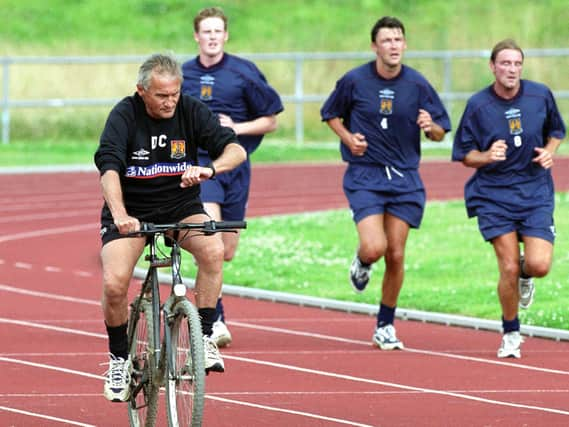

The long-serving former Town physio lost his lengthy battle with illness, and died on Sunday at the age of 77.
The news sparked a flurry of tributes from former players and Denis's friends, as well as the club's supporters.
Advertisement
Hide AdAdvertisement
Hide AdFor 23 years, Casey had been part of the fabric of life at Northampton Town, with 100s of players indebted to his skills as a physio, as well as his willingness to be a sounding board, or a shoulder to cry on.
IAN SAMPSON was one of those former Cobblers stars who worked under Casey, and here he talks to Chron sports editor Jeremy Casey and recalls life with 'Den' at both the County Ground and Sixfields.
Throughout Ian Sampson’s 449-game, 11-year career as a Cobblers player there was one thing that remained constant.
And that was the fact Denis Casey was the first-team physio all that time.
Advertisement
Hide AdAdvertisement
Hide AdIndeed, Casey was the first person Sampson clapped eyes on in Northampton when he arrived to start a loan spell from Sunderland in December, 1993.
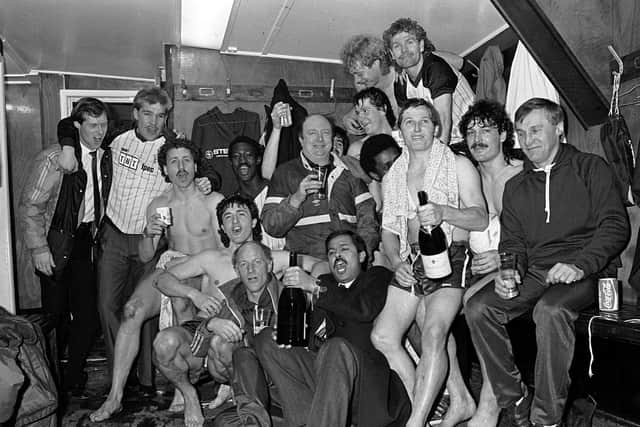

And the pair were to stay part of the fabric at the County Ground and then Sixfields until Sampson’s retirement from playing in the summer of 2004.
So there are few people better placed to outline just what a special person Casey, who passed away at the weekend following a long illness, really was.
Casey was physio at the Cobblers from 1985 to 2008, working for a total of 12 different managers, with Graham Carr the first, and Stuart Gray the last.
Advertisement
Hide AdAdvertisement
Hide AdHe started his Town career with the club based at the old County Ground, and ended it with Town having been long established at Sixfields.
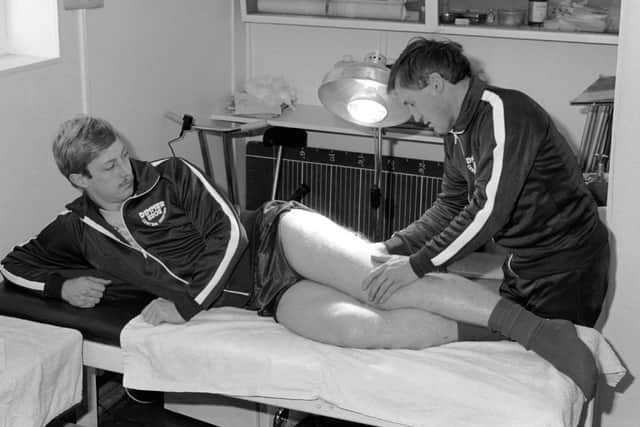

Casey worked with 100s of players during his time at the Cobblers, with many of them quick to pay tribute to him (see story on right), and Sampson, who returned to manage the club and is currently in charge of the Cobblers Academy, is another who has nothing but good things to say.
“Denis was the first person I ever saw in Northampton,” said Sampson.
“I got the train down from Newcastle and it was Denis who met me at the station, so that was my first encounter with Den as he picked me up and took me over to the County Ground.
Advertisement
Hide AdAdvertisement
Hide Ad“He was a very nice guy and he made me feel welcome straight away, so it was a great first impression of him.”
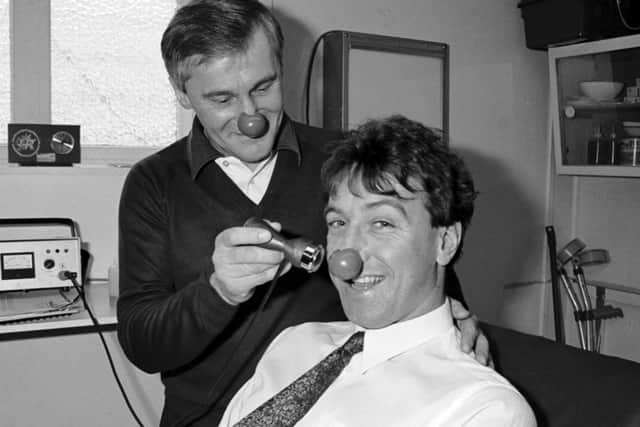

His new surroundings at the Cobblers’ somewhat dilapidated former home will have been something of a culture shock for Sampson, who had been used to life at Roker Park.
The ground itself only had three (actually two-and-a-half!) sides, with a small seating area famously dubbed the ‘Meccano Stand’, and the club shop and offices were based in a house on the other side of Abington Avenue, opposite the County Tavern pub.
That house was also where Casey’s physio room was based, and Sampson says he was able to operate in something approaching luxury!
Advertisement
Hide AdAdvertisement
Hide Ad“To be honest, Den had the biggest room in the club! The physio room was pretty good,” said the former central defender.
“There was the office at the back of where the club shop was, and I think Den’s room joined on to that, and his room was bigger than the dressing room!
“He did quite well for himself and had the best room in the house at the County Ground. For the rest of us it was pretty rubbish!”
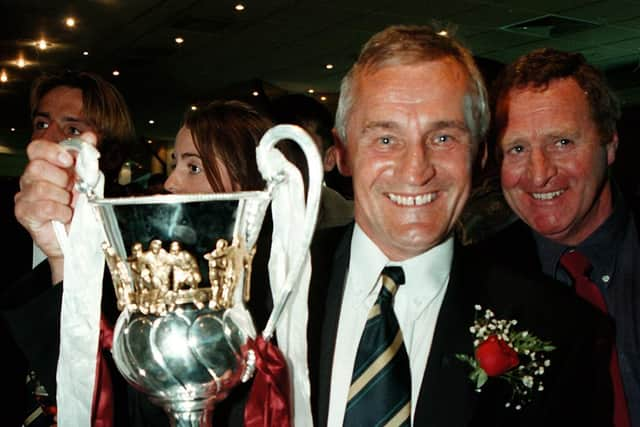

But he didn’t just operate from the Abington Avenue house - his second physio room was one that filled the players with dread, knowing that if they had to go there, they were in for a tough time!
Advertisement
Hide AdAdvertisement
Hide Ad“Another room Den had at the County Ground was like a little sweat box under the stand, at the end of that Meccano stand,” revealed Sampson. “If you were ever injured, it was like going into a dungeon going in there.
“It only had a couple of little windows, and he would work the socks off the injured players, it was phenomenal.
“Denis was really into his active rehab, and if you were injured you weren’t getting away with anything.
“Den would be on your case, he would make you work on the bike, and he took that to Sixfields as well.
Advertisement
Hide AdAdvertisement
Hide Ad“That is probably what I remember more than anything about his physio.
“When you are injured, some people think you are going just have an easy time, but that wasn’t Den.
“He would work those players so hard and I am sure there was method in his madness. The players had to work that hard that they didn’t want to be injured!
“If you were unlucky enough to be injured, you weren’t injured for long!”
Advertisement
Hide AdAdvertisement
Hide AdHaving qualified as a physio in 1980, Casey could have been forgiven for sticking to ‘old school’ methods,but Sampson says he was always an innovator, and always willing to learn and develop.
But he also still had a few old tricks up his sleeve.
“As a physio, I think he was probably ahead of his time a little bit,” he said.
“He was very much into active rehab and I think that is quite common practice now.
“He had an ultra-sound machine which he used to use on every injury, and I think that was a kind of placebo.
Advertisement
Hide AdAdvertisement
Hide Ad“But he also had this other machine that was almost an antique, and I am sure he said they used to use it on horses!
“It was a fetlock machine, a magneto pulse, and he used to put this on one side of your leg, and then the other side, and he used to put this magnet inbetween to test if there was any magnetic waves.
“Then he would say, ‘yeah that’s working, you’ll be right as rain in no time’, and I am sure it was all just a mental placebo effect, but it seemed to do the trick!
“So he wasn’t blessed with lots of modern technology, but he certainly made the most of what he had. He moved with the times as well though, with the different variations in techniques he was always at the forefront.
“Den was a really good physio, really hands on.”
Advertisement
Hide AdAdvertisement
Hide AdAnd it wasn’t just the physical side of things where Casey excelled in his job, he also took care of the the players’ mental well-being, a string that club physios across the land have to add to their bow.
“The physio is almost a shoulder to cry on as well, because there can be times when an injured player will hardly ever see the rest of the squad,” said Sampson.
“The injured player would be first in with Den in the morning, and the last to leave at night, so he was a really good sounding board as well.
“He will have also taken a lot of rubbish from the managers at the time.
Advertisement
Hide AdAdvertisement
Hide Ad“I certainly know that whenever we got beat or there was a punishment to be had on a Sunday morning, it would be Denis that had to take it.
“Akkers (Ian Atkins) would on his way back home on a Saturday night, not intending to turn up on the Sunday morning and leave everything to Den.
"So he had a lot to put up with as well, but he always came in with a smile on his face, and he always used to say ‘a running dog is a happy dog’.
"But he backed the managers at the time, and they certainly backed him in terms of what he had to do with the injured players.
Advertisement
Hide AdAdvertisement
Hide Ad“His longevity at the club, working with quite a lot of managers, shows just what a good guy he was, and how good he was at his job.”
Another skill a physio must possess is staying calm and being able to carry on regardless amidst the madness that can often engulf a football club - whether that be down to success or failure.
Casey certainly had to work through plenty of both during his time at the Cobblers, and Sampson said: “Den was very good at staying level-headed.
“He never got carried away with success, and he didn’t get too despondent either, probably because he had seen a lot of it previously.”
Advertisement
Hide AdAdvertisement
Hide AdAnother asset Casey had was that he could also play the game.
A former Town youth team player, he enjoyed a lengthy career in non-League football with Wellingborough Town and Banbury United, and he liked to keep his hand in when he got the chance!
“Everyone at the club had a great affiliation with Den,” explained Sampson
“He used to take us over the far side where we used to get changed at Sixfields, and he was renowned for being the one and two-touch specialist.
Advertisement
Hide AdAdvertisement
Hide Ad“So when the lads were injured he used to do this little game with the ball, and we used to keep it away from each other using one or two touch - and Den always won!
“He won because he was the senior person around and he served every time. He used to whack the ball at you so hard that you couldn’t control it with one or two touch!
“He was a master of that, the master of working you hard - and also the long bike rides when you were injured.
“I was fortunate in that I didn’t have any long-term injuries, but somebody like Roy (Hunter) will have many a story about Den because he spent a lot of time with him.”
Advertisement
Hide AdAdvertisement
Hide AdCasey made a huge impression on everybody he encountered both in football and away from it, and he will deservedly take his place in the Cobblers history books.
And as a final word, Sampson said: “Den’s loyalty to the club should be respected fantastically well.
"But the fact is he was just such a good guy, a great guy.”
Comment Guidelines
National World encourages reader discussion on our stories. User feedback, insights and back-and-forth exchanges add a rich layer of context to reporting. Please review our Community Guidelines before commenting.